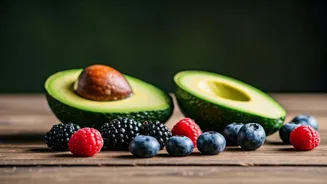Understanding Sugar Spikes
Sugar spikes can significantly impact overall health. They happen when the body processes excessive amounts of sugar, leading to a rapid increase in blood
glucose levels. This abrupt rise can trigger a cascade of negative effects, from energy crashes to increased risks of diabetes and heart diseases. Therefore, understanding the causes of sugar spikes, which commonly include diets high in processed foods and simple carbohydrates, is important. Recognizing the early signs, such as increased thirst, fatigue, and frequent urination, enables prompt action. Incorporating superfoods into one's diet offers a natural approach to managing and mitigating these spikes. These foods provide essential nutrients and compounds that regulate blood sugar, helping to maintain a more balanced and healthier internal environment.
The Power of Cinnamon
Cinnamon, a common spice, is recognized for its ability to improve insulin sensitivity, the hormone responsible for regulating blood sugar levels. Studies suggest that consuming cinnamon can help the body use insulin more effectively, thereby reducing blood sugar spikes after meals. This spice contains compounds that mimic the effects of insulin, which allows glucose to enter cells for energy. The inclusion of cinnamon in the diet is a simple yet impactful method for diabetes management and general health improvement. A small amount of cinnamon, such as half a teaspoon daily, can have a noticeable positive effect. It can be added to various dishes, including oatmeal, coffee, or smoothies. Always consult with a healthcare professional before making significant dietary changes, especially if you are taking medication.
Benefits of Avocados
Avocados, rich in healthy fats and fiber, are exceptionally effective in controlling sugar spikes. Unlike foods high in carbohydrates that rapidly increase blood sugar, the high-fat content of avocados slows down the digestion and absorption of glucose. This slow release prevents sudden surges in blood sugar levels. The fiber in avocados also contributes to this regulation by promoting a slower digestion rate and improving satiety, which in turn, helps in managing food intake. Including avocados in meals provides essential nutrients and helps maintain a stable blood sugar level. You can incorporate avocados in salads, sandwiches, or even as a standalone snack. Consuming half to one avocado daily can offer significant benefits. Consider this superfood for a practical, tasty solution to maintain healthy blood sugar levels.
Berries and Blood Sugar
Berries, such as blueberries, strawberries, and raspberries, are packed with antioxidants, fiber, and nutrients that help manage blood sugar levels effectively. These fruits have a low glycemic index, indicating that they release sugar slowly into the bloodstream, preventing sharp blood sugar spikes. Their high fiber content also supports better sugar regulation by slowing digestion and increasing fullness. Moreover, berries contain antioxidants that can reduce inflammation and protect against insulin resistance, common issues associated with diabetes. Consuming a serving of berries daily, such as a cup, is a delicious and healthy way to help control blood sugar levels. Berries can be added to breakfast cereals, smoothies, or eaten as a snack. They offer a sweet treat and a practical step toward improved metabolic health.
Nuts: A Smart Choice
Nuts, particularly almonds, walnuts, and pecans, offer a mix of healthy fats, fiber, and protein that contributes to balanced blood sugar levels. The combination of these nutrients helps to slow down the digestion of carbohydrates, preventing rapid sugar spikes after eating. Nuts have a low glycemic index, similar to berries, which makes them a valuable snack for individuals aiming to manage their blood sugar. Regular consumption of nuts can improve insulin sensitivity, making the body more efficient at using glucose. It is best to consume a small handful (around a quarter of a cup) of nuts daily, as they are calorie-dense. They can be enjoyed as a snack or added to salads, yogurts, or other meals. Including nuts in your diet provides a practical and enjoyable way to control blood sugar levels, promoting overall health and well-being.















